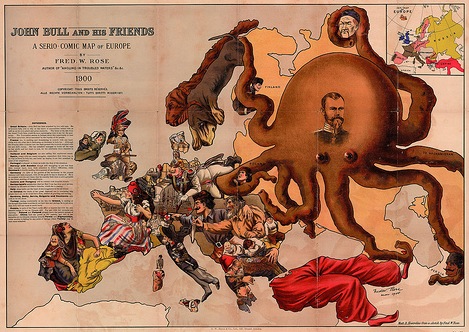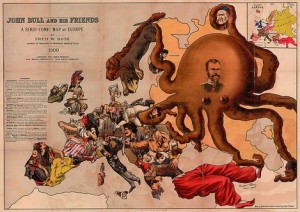In the beginning was the Rome Treaty. 60 odd years down the line the visions that helped forge together that agreement need some new PR. The first steps of European integration were built on the idea that if the main strategic resources were pooled together (coal, steel, atomic energy) and if a situation of mutually beneficial economic interdependence could be created, then nations that had been at each others’ throats for centuries would have a strong incentive to be at peace. The carrot for such peaceful coexistence was economic prosperity and strength. The European Community was born.
60 years have seen the Community transform to a Union and expand exponentially to include 29 member states. The original driving force of the groups of states has long stopped to be simply of an economic character. The exclusive club of states has not only expanded numerically but also has gone through a bumpy phase of deeper integration that extended into the social and political spheres. In the late nineties one of the standard tensions that was closely observed in the community was that between intergovernmental and federalist forces. The reference was structural, the effect strongly political. The negotiation and the project – whatever shape it took – remained firmly anchored among nation states. The demos was still absent – in the late nineties it was still a matter of sovereign states notwithstanding the European legal order having made huge inroads into the national systems. The “give and take” and the legitimacy question was still firmly rooted at national government level.
Yet, even the early case law that shaped the European Union we now know contained references to the role of the demos in what would eventually be seen as a constitutional construct:
The Community constitutes a new legal order of international law for the benefit of which the states have limited their sovereign rights, albeit within limited fields and the subjects of which comprise not only member states but also their nationals. Independently of the legislation of member states, community law therefore not only imposes obligations on individuals but is also intended to confer upon them rights which become part of their legal heritage. These rights arise not only where they are expressly granted by the treaty, but also by reason of obligations which the treaty imposes in a clearly defined way upon individuals as well as upon the member states and upon the institutions of the community.
—Judgment of the Court of 5 February 1963 (Van Gend en Loos)
Until now, the functional imperatives for the construction of a common market and the Euro-zone have driven reforms. These driving forces are now exhausted. A transformative politics, which would demand that member states not just overcome obstacles for competitiveness but form a common will, must take recourse to the motives and attitudes of the citizens themselves. Majority decisions on highly consequential foreign policies can only expect acceptance assuming the solidarity of outnumbered minorities. But this presupposes a feeling of common political belonging on both sides. The population must so to speak “build up” their national identities and add to them a European dimension. What is already a fairly abstract form of civil solidarity, still confined to members of nation-states, must be extended to include the European citizens of other nations as well. (Jürgen Habermas and Jacques Derrida, ‘February 15, or What Binds Europe Together: Plea for a Common Foreign Policy, Beginning in Core Europe’, in Frankfurter Allgemeine Zeitung, 31 May 2003.)
This raises the question of “European identity”. Only the consciousness of a shared political fate, and the prospect of a common future, can halt outvoted majorities from the obstruction of a majority will. The citizens of one nation must regard the citizens of another nation as fundamentally “one of us”. This desideratum leads to the question that so many skeptics have called attention to: are there historical experiences, traditions, and achievements offering European citizens the consciousness of a political fate that has been shared together, and that can be shaped together? An attractive, indeed an infectious “vision” for a future Europe will not emerge from thin air. At present it can arise only from the disquieting perception of perplexity. But it well can emerge from the difficulties of a situation into which we Europeans have been cast. And it must articulate itself not from out of the wild cacophony of a multi-vocal public sphere. If this theme has so far not even gotten on to the agenda, it is we intellectuals who have failed. (Habermas & Derrida, vide supra)


